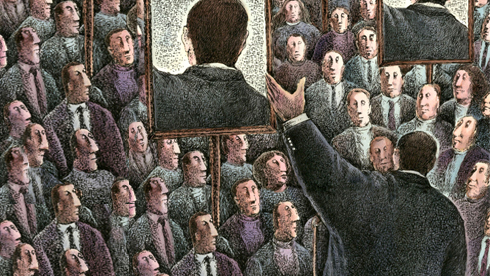For several decades, US presidents have honoured the custom of delivering a State of the Union address early in the New Year. The State of the Union is a rallying speech to Congress, which outlines the plans and challenges for the months ahead. And it is well-received to the point where, every two or three lines, the president is interrupted by a standing ovation. We have yet to witness a Mexican wave in Congress, but the scenes at the State of the Union do not fall far short of such a spectacle. Tens of millions of Americans eagerly watch the speech, which is broadcast live by virtually every TV channel. Then, for days afterwards, commentators continue to dissect every word, each letter and comma, while newspapers print additional supplements.
Today the President of the European Commission, José Manuel Barroso, is to present his State of the Union for the EU. Since 2010, he has addressed the European Parliament at the start of the political year. And although the Flemish TV programme Villa Politica plans to broadcast the speech, most of the viewing audience will probably be residents in Belgium’s hospitals and retirement homes. Afterall Mr Barroso’s speech is delivered in the morning, instead of during prime time, which is the case in the US. We have not been able to confirm whether it will be broadcast on other TV channels, however, we are willing to bet that the majority of newspapers will publish their report on the speech in a small column tucked away on one of the foreign news pages.
[video:4134891]There is no denying that the European State of the Union is a poor substitute for the American version, particularly in terms spectacle. Europe is not the USA, of course, even though we are already a lot further along the road to becoming the United State of Europe than we actually realise. But we have to admit that there are areas in which Europe’s central government holds a lot less clout than the American administration. Take for example the field of foreign policy.
If Barack Obama were to decide to stage an offensive in Syria, then it would certainly go ahead. The European President, Herman Van Rompuy, does not wield such power. Of course, this may be due to the fact that he has no army at his disposal.
In other fields, however, Brussels’ influence on EU countries is far greater than the power that Washington holds over the fifty American states. And over the past few years, largely as a result of the euro crisis, this power has steadily increased.
[[Debates on the subject of our domestic budgets are now entirely overshadowed by ‘what Europe will actually permit’]]. When our government made a big show of appointing a new National Railways CEO, they forgot to mention that the framework in which he is to operate has already been laid down in a series of European railway packages. European legislation also determines how the postal service and the energy market operate. The price we pay for mobile phone calls and thousands of other mundane matters are all subject to European regulation: from the definition of chocolate to the manner in which the eyes should be attached to a child’s teddy bear.
Limited room for manoeuvre
In this country, we are all excited by the prospect of Flemish and federal elections to be held on 25 May 2014. Journalists are over the moon, and spin doctors are gazing into their crystal balls. The contest, at least so we are told, is all about the position of the New Flemish Alliance (N-VA) and the manner in which Belgium will be run in future. There is hardly any mention of the European elections that are to be held on the same date. In many ways, the European states are far more united than those of America. However, for some strange reason, we are loathe to admit it, and we are even less interested in the ins and outs of the matter.
There are still areas in which we can establish our own national policies. However, they are becoming few and far between and the room for manoeuvre is increasingly limited. Europe sets the course, and the European Parliament has a substantial influence. In fact, when it comes to legislation, it even has the final say. And this is also the parliament that will choose the future president of the European Commission, and deliver an assessment for every future EU commissioner.
As anyone who takes the trouble to scratch the ostensibly smooth surface of European dossiers soon discovers, there are substantial decisions of an ideological nature to be made: about the relationship between growth and austerity measures, about the significance of cultural diversity, about social topics and liberalisation, about agriculture and development.
European policy could still go in numerous directions, and the European parliament will have a major impact on the choices that are made. However, this interests us less than the issue of whether we will implement European regulations on a federal basis, or as a confederacy.
The extent to which Europe is embedded in both major political issues and mundane matters is remarkable, and so too is our ability to ignore this reality. In a word, Europe remains in a blind spot.
Was this article useful? If so we are delighted!
It is freely available because we believe that the right to free and independent information is essential for democracy. But this right is not guaranteed forever, and independence comes at a cost. We need your support in order to continue publishing independent, multilingual news for all Europeans.
Discover our subscription offers and their exclusive benefits and become a member of our community now!












